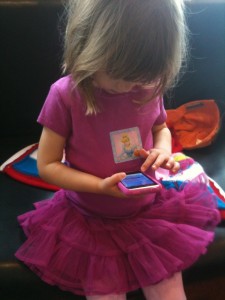From today’s New York Times Book Review:
While reading “Hamlet’s BlackBerry,†I sporadically paused to check my iPhone — whenever its ping signaled the arrival of a new e-mail message. I hated to turn away from William Powers’s elegant meditation on our obsessive connectivity and its effect on our brains and our very way of life. But I did anyway.
Powers suggests that evolutionary programming may be partly responsible for the drive that has many of us constantly checking our digital screens. We are wired by nature, he notes, to pay attention to new stimuli, thereby helping us to respond quickly to predators or to nab a potential meal. The biochemical effect of the iPhone ping, in fact, might be injecting my brain with what one scientist calls a “dopamine squirt.â€Â In other words, marketers have told us we must be connected all the time, and our brains have done the rest. The author worries that our homes, the traditional shelter from the crowd, have been invaded to the point where we may be in danger of no longer connecting deeply with our families, our books and our thoughts.
But Powers, a former staff writer at The Washington Post who has written extensively on media and technology, is not simply an earnest foreteller of doom. He is well aware that human beings are always capable of gaining more than they lose with every new technology. It has been 25 years since the publication of Neil Postman’s “Amusing Ourselves to Death,†with its dire warning of television’s potential to erode not only public discourse but thinking itself. In Postman’s wake, we now have both Fox News, which most days represents his worst nightmare, and long-form works of art like “The Wire,†which afford us a perch to see how the world works and how we are all connected — in the same way that great storytellers and thinkers have been doing since the beginning of recorded history. Personally, I would not trade “The Wire†to get rid of Glenn Beck. Some may disagree.
Powers knows that we will learn to cope with constant connectivity. It’s just a matter of how. His book asks us to begin to think about behaviors that may still as yet be unexamined.It should surprise no student of history that this moment in time — when many of us feel as if we’re teetering on the edge of a brand-new technological cliff — can also be seen as a familiar human problem. Powers reminds us of when Socrates, the greatest of all oral communicators, was freaking out over “the very latest communications technology, written language based on an alphabet†(though as Powers concedes, “writing wasn’t completely newâ€). Socrates believed that scrolls would erode thought by permitting people to forget what they had learned because they’d be able to look things up, that “they wouldn’t feel the need to ‘remember it from the inside, completely on their own.’ †Worse, writing wouldn’t “allow ideas to flow freely and change in real time, the way they do in the mind during oral exchange.â€
Or try to imagine the fears of the 15th-century Italian scholar who saw Gutenberg’s printing press mostly as a license to erode seriousness and to libel others. He wrote: “Because now that anyone is free to print whatever they wish, they often disregard that which is best and instead write merely for the sake of entertainment. . . . And even when they write something worthwhile they twist it and corrupt it to the point where it would be much better to do without such books.â€
Powers spends too much time describing the techno bind that we find ourselves in today and that we already know so well. But for the most part his ruminations are penetrating, his language clear and strong, and his historical references are restorative. As a salve for those who are perhaps prematurely mourning the death of paper, Powers writes of his preference for jotting down ideas in a Moleskine notebook, a “seemingly anachronistic tool†that he feels is essential to his well-being. Most writers still love paper. Some things are irreplaceable, and Powers explains why. His notebook allows him to “pull ideas not only out of my mind but out of the ethereal digital dimension and give them material presence and stability. Yes, you exist,†the notebook reminds us, “you are worthy of this world.â€


